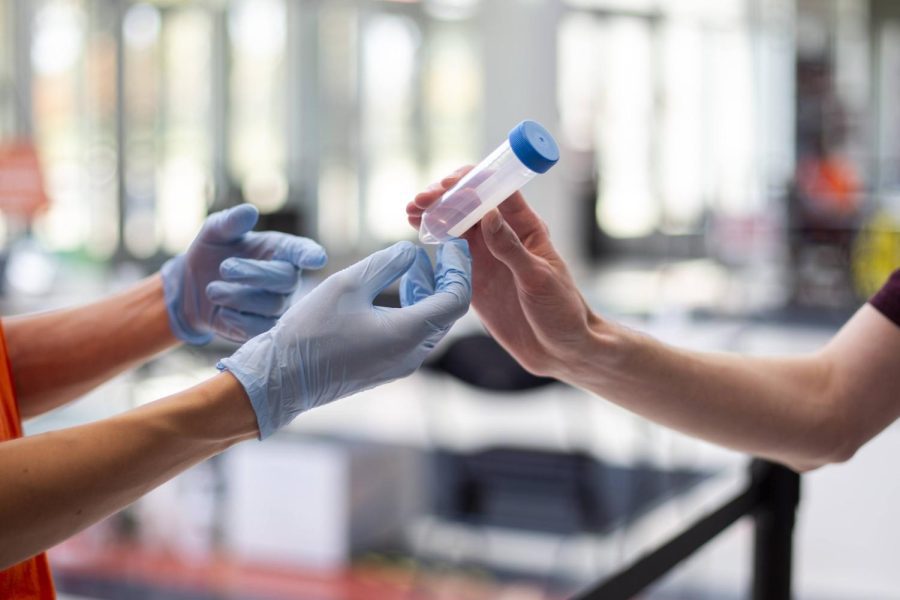Public health experts concerned about spread of COVID-19, flu during winter
A SHIELD worker hands over an empty tube for COVID-19 testing at the State Farm Center on Oct. 9, 2020.
December 5, 2022
Public health experts have concerns about the spread of COVID-19 combined with an increase in other illnesses, such as the flu, during the winter.
Rebecca Lee Smith, epidemiologist and associate professor in Veterinary Medicine, said COVID-19 cases will likely increase during the winter months.
“Regarding COVID, it continues to be the same concern, which is the seasonal concern,” Smith said. “More students will be inside, therefore are exposed more, and the dry air makes people more susceptible for respiratory illnesses.”
With this potential increase in the seasonal spread COVID-19, many should take precautions to decrease their exposure to the virus by taking certain steps, she said.
“The best thing you can do for yourself is to get vaccinated and to wear a mask in public places,” Smith said.
Get The Daily Illini in your inbox!
Smith said her biggest concern is the co-circulation of the flu, COVID-19 and respiratory syncytial virus, a virus that causes mild, cold-like symptoms.
“They’re all at high levels right now causing many people to get sick,” she said.
So far this season, the Centers for Disease Control and Prevention estimated that there have been about 4.4 million people who had the flu or who currently have it. The CDC also noted that flu activity is elevated across the country.
According to Smith, younger children and older individuals have higher chances of getting respiratory syncytial virus compared to other age groups.
Right now, RSV’s rate among infants is seven times what it was before the COVID-19 pandemic. About 171 out of every 100,000 infants younger than 6 months were hospitalized with RSV during the second week of November. Most states claim that their hospitals are at 80% capacity due to the increase in flu and RSV cases, according to CNBC.
On Oct. 16, in a COVID-19 update email sent to students, the University stated that face coverings will be strongly encouraged in University spaces following fall break.
Many students, however, aren’t wearing masks or social distancing because they think COVID-19 is not a concern anymore.
“Right now I would say I don’t have any concerns and don’t wear a mask outside,” said Shubh Goyal, sophomore in LAS. “The number of cases around me is also lower than it has been. Additionally, me being vaccinated reduces my chances of getting COVID.”
The only COVID-19 testing centers available on campus are at the Illini Union and CRCE.
Precautions for RSV and the flu are similar to COVID-19. One such precaution is getting the flu vaccine, while another is trying to not linger in public places for long periods of time. If a person is, one should wear a mask. Washing hands frequently is another way to prevent the spread of germs.
Students have noticed the increase in sickness recently and are concerned about the spread of it.
“I’ve basically been getting sick all the time almost every other week. I’ve seen other people around me getting sick as well,” said Niveditha Iyengar, freshman in FAA. “I want to just spend my time focusing on my school work. Instead, I’m worrying about getting sick.”
Smith said taking extra precautions around this time of year will prevent the spread of germs and illness.
“Best to protect yourself, get vaccinated, stay healthy,” Smith said. “If you get sick, stay home. Even if you test negative for COVID-19, it could be RSV or the flu.”







